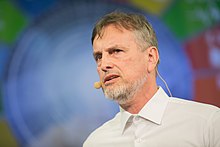于爾根·施密德胡伯
| 于爾根·施密德胡伯 Jürgen Schmidhuber | |
|---|---|
 施密德胡伯在2017年AI for GOOD全球峰會上演說 | |
| 出生 | 1963年1月17日[1] |
| 國籍 | |
| 母校 | 慕尼黑工業大學 |
| 知名於 | 人工智慧 深度學習 人工智能網路 循環神經網路 長短期記憶 哥德爾機 元學習 |
| 網站 | people |
| 科學生涯 | |
| 研究領域 | 人工智慧 |
| 機構 | 達勒·莫勒人工智慧研究所 |
于爾根·施密德胡伯(德語:Jürgen Schmidhuber,1963年1月17日—)[1]是一名德國計算機科學家,以人工智能、深度學習和人工神經網絡領域的成就而知名,現任位於瑞士南部提契諾州盧加諾區曼諾的達勒·莫爾人工智能研究所(IDSIA)聯合主任[2]。施密德胡伯有時被稱為「(現代)AI之父」[3][4][5][6][7]或「深度學習之父」[8]。
施密德胡伯在德國慕尼黑工業大學完成了本科學業。2004年至2009年,他在瑞士盧加諾的瑞士意大利語區大學擔任人工智能教授[9]。2021年10月1日,施密德正式加入阿卜杜拉國王科技大學,擔任人工智能研究院院長。[10]
工作
[編輯]1997年,施密德胡伯和塞普·霍赫賴特發表了關於一種循環神經網絡類型的論文,他們稱之為長短期記憶網絡(LSTM)。2015年,LSTM被Google用於智能手機中新的語音識別實現[2]。Google也在智能助手Allo和Google翻譯中使用了LSTM[11][12][13]。蘋果公司在iPhone的「Quicktype」功能和Siri中使用了LSTM[14][15][16]。亞馬遜公司在Amazon Alexa中使用LSTM[17]。2017年,Facebook每天使用LSTM網絡進行約45億次自動翻譯[18]。彭博商業周刊寫道:「這些能力使得LSTM成為最具商業化的AI成就,應用於預測疾病和創作音樂等方方面面。」[19]
2011年,施密德胡伯在IDSIA的團隊與他的博士後丹·奇雷尚(Dan Ciresan)在快速並行計算機(GPU)上實現了卷積神經網絡(CNN)的顯著加速。丹·奇雷尚等人的深度卷積神經網絡比CPU上的等效實現快了60倍[20],於2011年8月在計算機視覺競賽中成為第一個超過人類表現的模型[21]。2011年5月15日至2012年9月10日期間,他們的快速深度CNN贏得了至少四場圖像比賽[22][23]。他們還顯著改善了文獻中針對各種圖像數據庫的最佳性能[24]。這種方法基於楊立昆等人早期提出的CNN設計[25],已成為計算機視覺領域的核心[23]。
2014年,施密德胡伯成立了一家名為Nnaisense的公司,致力於在金融、重工業和自動駕駛汽車等領域開展人工智能的商業應用。塞普·霍赫賴特、賈恩·塔林和馬庫斯·哈特(Marcus Hutter)任公司顧問[2]。Nnaisense於2017年1月籌集了首輪資金。施密德胡伯的總體目標是通過在各種特定任務中順序訓練單個AI來創建通用AI。但懷疑者指出,像Arago GmbH和IBM這樣的公司已經在各式項目中應用了多年的AI,但沒有出現任何強人工智能的跡象。[26]
觀點
[編輯]根據《衛報》的報道[27],施密德胡伯在2015年發表的一篇「嚴厲的文章」中,指責同行的深度學習研究員傑弗里·辛頓、楊立昆和約書亞·本希奧「大量互相引用」,卻「沒有提及該領域的先驅者」,稱他們低估了施密德胡伯自己和其他早期機器學習先驅者的貢獻,包括於1965年發表首個深度學習網絡的阿列克謝·格里戈里耶維奇·伊瓦赫年科(Alexey Grigorevich Ivakhnenko)。楊立昆否認了這一指責,表示施密德胡伯「總是主張他所不該得到的名譽」。[2][27]施密德胡伯本人則提出反對,聲稱楊立昆並沒有以實例來支持該主張,並自己列出了許多成果的優先權爭論加以反駁。[28]
榮譽
[編輯]施密德胡伯於2013年獲國際神經網絡學會的亥姆霍茲獎[29],並在2016年獲得了IEEE計算智能學會的神經網絡先驅獎[30]。他還是歐洲科學與藝術院的成員[31][9]。
參考資料
[編輯]- ^ 1.0 1.1 1.2 CV. [2019-04-07]. (原始內容存檔於2020-11-13).
- ^ 2.0 2.1 2.2 2.3 John Markoff (27 November 2016). When A.I. Matures, It May Call Jürgen Schmidhuber 『Dad』. The New York Times. Accessed April 2017.
- ^ Wong, Andrew. The 'father of A.I' urges humans not to fear the technology. CNBC. 2018-05-16 [2019-02-27]. (原始內容存檔於2020-11-09).
- ^ Blunden, Mark. Humans will learn to confide in their robot friends, says AI expert. The father of modern AI believes robots could keep lonely people company. The Evening Standard. 2018-06-08 [2019-02-27]. (原始內容存檔於2019-09-26).
- ^ Micklethwaite, Jamie. The day robots become smarter than humans will arrive on THIS DATE. THE day robots become smarter than humans is just round the corner, according to a man dubbed “the father of artificial intelligence”.. Daily Star. 2018-02-17 [2019-02-27]. (原始內容存檔於2019-04-07).
- ^ The ‘father of A.I.’ urges humans not to fear the technology. South China Morning Post. 2018-05-16 [2019-02-27]. (原始內容存檔於2020-09-21).
- ^ Sony WOW Studio at SXSW 2019, Austin, Texas: Quote: "the guest speakers include Juergen Schmidhuber, the father of modern artificial intelligence who revolutionized machine learning with his lab's deep learning neural networks and Avast Security Ambassador, Garry Kasparov who is widely regarded as the greatest chessplayer in history.". PR Newswire. 2019-02-22 [2019-02-27]. (原始內容存檔於2022-05-17).
- ^ Wang, Brian. Father of deep learning AI on General purpose AI and AI to conquer space in the 2050s. Next Big Future. 2017-06-14 [2019-02-27]. (原始內容存檔於2020-11-11).
- ^ 9.0 9.1 Dave O'Leary (3 October 2016). The Present and Future of AI and Deep Learning Featuring Professor Jürgen Schmidhuber. IT World Canada. Accessed April 2017.
- ^ KAUST. Professor Jürgen Schmidhuber appointed as the Director of the KAUST Artificial Intelligence Initiative. KAUST Websites. [2021-11-23]. (原始內容存檔於2021-11-23).
- ^ Khaitan, Pranav. Chat Smarter with Allo. Research Blog. 2016-05-18 [2017-06-27].[失效連結]
- ^ Wu, Yonghui; Schuster, Mike; Chen, Zhifeng; Le, Quoc V.; Norouzi, Mohammad; Macherey, Wolfgang; Krikun, Maxim; Cao, Yuan; Gao, Qin. Google's Neural Machine Translation System: Bridging the Gap between Human and Machine Translation. 2016-09-26. arXiv:1609.08144
 [cs.CL].
[cs.CL].
- ^ Metz, Cade. An Infusion of AI Makes Google Translate More Powerful Than Ever | WIRED. Wired. 2016-09-27 [2017-06-27]. (原始內容存檔於2020-11-08).
- ^ Efrati, Amir. Apple's Machines Can Learn Too. The Information. 2016-06-13 [2017-06-27]. (原始內容存檔於2017-08-09).
- ^ Ranger, Steve. iPhone, AI and big data: Here's how Apple plans to protect your privacy | ZDNet. ZDNet. 2016-06-14 [2017-06-27]. (原始內容存檔於2020-11-08).
- ^ Smith, Chris. iOS 10: Siri now works in third-party apps, comes with extra AI features. BGR. 2016-06-13 [2017-06-27]. (原始內容存檔於2020-11-12).
- ^ Vogels, Werner. Bringing the Magic of Amazon AI and Alexa to Apps on AWS. - All Things Distributed. www.allthingsdistributed.com. 2016-11-30 [2017-06-27]. (原始內容存檔於2020-07-27).
- ^ Ong, Thuy. Facebook's translations are now powered completely by AI. www.allthingsdistributed.com. 2017-08-04 [2019-02-15]. (原始內容存檔於2020-11-27).
- ^ Vance, Ashlee. Quote: These powers make LSTM arguably the most commercial AI achievement, used for everything from predicting diseases to composing music.. Bloomberg Business Week. 2018-05-15 [2019-01-16]. (原始內容存檔於2020-11-07).
- ^ Ciresan, Dan; Ueli Meier; Jonathan Masci; Luca M. Gambardella; Jurgen Schmidhuber. Flexible, High Performance Convolutional Neural Networks for Image Classification (PDF). Proceedings of the Twenty-Second International Joint Conference on Artificial Intelligence-Volume Volume Two. 2011, 2: 1237–1242 [2013-11-17]. (原始內容存檔 (PDF)於2013-11-16).
- ^ IJCNN 2011 Competition result table. OFFICIAL IJCNN2011 COMPETITION. 2010 [2019-01-14]. (原始內容存檔於2019-01-21).
- ^ Schmidhuber, Jürgen. History of computer vision contests won by deep CNNs on GPU. 2017-03-17 [2019-01-14]. (原始內容存檔於2018-12-19).
- ^ 23.0 23.1 Schmidhuber, Jürgen. Deep Learning. Scholarpedia. 2015, 10 (11): 1527–54 [2019-04-07]. PMID 16764513. doi:10.1162/neco.2006.18.7.1527. (原始內容存檔於2016-04-19).
- ^ Ciresan, Dan; Meier, Ueli; Schmidhuber, Jürgen. Multi-column deep neural networks for image classification. New York, NY: Institute of Electrical and Electronics Engineers (IEEE). June 2012: 3642–3649. ISBN 978-1-4673-1226-4. OCLC 812295155. arXiv:1202.2745
 . doi:10.1109/CVPR.2012.6248110.
. doi:10.1109/CVPR.2012.6248110. |journal=被忽略 (幫助) - ^ Y. LeCun, B. Boser, J. S. Denker, D. Henderson, R. E. Howard, W. Hubbard, L. D. Jackel, Backpropagation Applied to Handwritten Zip Code Recognition (頁面存檔備份,存於網際網路檔案館); AT&T Bell Laboratories
- ^ AI Pioneer Wants to Build the Renaissance Machine of the Future. Bloomberg.com. 2017-01-16 [2018-02-23]. (原始內容存檔於2020-11-12).
- ^ 27.0 27.1 Oltermann, Philip. Jürgen Schmidhuber on the robot future: ‘They will pay as much attention to us as we do to ants'. the Guardian. 2017-04-18 [2018-02-23]. (原始內容存檔於2022-04-10).
- ^ Schmidhuber, Jürgen. Critique of 2018 Turing Award. Schmidhuber's AI Blog. 2020 [23 August 2021]. (原始內容存檔於2021-12-08).
- ^ INNS Awards Recipients. International Neural Network Society. Accessed December 2016.
- ^ Recipients: Neural Networks Pioneer Award. Piscataway, NJ: IEEE Computational Intelligence Society. Accessed January 2019.]
- ^ Members. European Academy of Sciences and Arts. Accessed December 2016.
